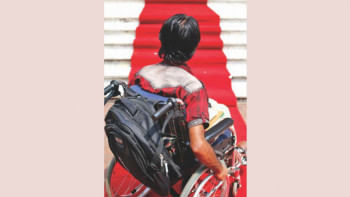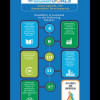Amplifying leadership for an inclusive and sustainable future

Each year, the International Day of Persons with Disabilities on December 3 serves as a critical reminder of the ongoing journey towards creating an inclusive world. This year's theme, "Amplifying the Leadership of Persons with Disabilities for an Inclusive and Sustainable Future," underscores the transformative role of people with disabilities as active leaders shaping societies rather than passive recipients of aid or charity. For Bangladesh, this theme resonates deeply, especially as the nation reflects on its commitments under the UN Convention on the Rights of Persons with Disabilities and the Rights and Protection of Persons with Disabilities Act (RPPD), 2013.
More than a decade since the enactment of the law, the time has come to transition from policy rhetoric to tangible actions. The current sociopolitical landscape following the student-led mass uprising in July-August presents a unique opportunity for the interim government to chart a progressive course by reinforcing disability rights through robust implementation measures. One such transformative measure could be the introduction of a "disability budget," a structured approach to ensuring the rights of persons with disabilities (PWDs) through equitable resource allocation across ministries.
The term "disability budget" is often misunderstood as requiring additional funds, but that is not the case. A disability budget entails allocating resources within the existing budgets of various ministries specifically for initiatives benefiting PWDs. Much like the gender, child, and climate budgets introduced in Bangladesh, a disability budget would mainstream disability considerations into national planning, ensuring that no person with a disability is left behind.
Bangladesh has successfully pioneered thematic budgets for gender, children, and climate change. These frameworks have demonstrated that targeted budgeting can create significant positive impacts by channelling resources towards specific, under-addressed issues and target groups. Similarly, a disability budget could help prioritise the needs of PWDs in education, health, infrastructure, social protection, information and technology, and more.
The call for a disability budget is firmly grounded in Bangladesh's legal obligations. The constitution guarantees equal rights and protection for all citizens. The UN convention, ratified by Bangladesh in 2007, mandates state parties to ensure inclusive development. Additionally, the RPPD provides a national framework to uphold the rights of PWDs.
Introducing a disability budget should follow a phased approach, starting with key ministries such as finance, health, education, social welfare, planning, ICT, transport, etc. These ministries are critical to fulfilling the National Action Plan for Persons with Disabilities. The process should involve identifying disability-inclusive programmes within the existing ministry budgets, developing mechanisms for accountability and monitoring to ensure effective utilisation of allocated resources and engaging stakeholders (including relevant national and international organisations, economists, and organisations of PWDs) in the planning and implementation process.
A disability budget would clearly delineate responsibilities across ministries, fostering accountability for implementing disability-related policies and programmes. It would also enable systematic monitoring of progress, ensuring alignment with national and international commitments including the commitments made by Bangladesh in the Global Disability Summit 2022.
Moreover, a well-planned disability budget has the potential to create transformative change in the lives of PWDs by ensuring targeted resource allocation across critical sectors. Disability is a cross-cutting issue that affects various aspects of life—from education and employment to transportation and health. A ministry-wise disability budget can bridge systemic gaps and empower PWDs to live with dignity and independence.
A disability budget can promote inclusive education by ensuring that schools, colleges, and universities are accessible to all students. This includes infrastructural development such as funding for ramps, accessible classrooms, and toilets in educational institutions. It will also address crucial needs including providing assistive devices such as Braille readers, screen readers, and hearing aids for students with disabilities, allocating resources for training teachers on inclusive teaching methods and understanding diverse needs and financial support for students with disabilities to reduce dropout rates and encourage higher education.
Again, economic empowerment is critical for persons with disabilities. A disability budget can ensure funding for skills development programmes tailored to the needs of PWDs, such as IT training, handicrafts and entrepreneurship, grants for businesses to make their premises accessible, such as adding ramps, lifts and assistive technology, resources to monitor and enforce existing quotas for employing PWDs in public and private sectors, and establishment of dedicated job centres to connect PWDs to employers and provide career counselling.
Access to information and technology is essential in today's world. A disability budget can ensure accessible digital platforms so that the development of government websites and digital services comply with accessibility standards, provide low-cost smartphones, computers and internet packages for PWDs, and enhance digital literacy through conducting workshops and training programmes to teach PWDs how to use digital tools effectively.
Lack of accessible transportation is one of the major barriers for PWDs in Bangladesh. A disability budget can help make the public transport accessible by retrofitting buses, trains and ferries with ramps, ensuring reserved seating and audio-visual announcements, offering travel allowances or free passes to reduce financial burdens of PWDs, and ensuring funding initiatives to make roads, sidewalks and traffic signals disability-friendly. Improved mobility significantly allows PWDs to access education, jobs, healthcare and social activities, significantly enhancing their quality of life.
Individuals with disabilities often face serious challenges in accessing healthcare. A disability budget can prioritise rehabilitation services by establishing affordable centres for physical therapy, speech therapy and mental health support, subsidising the cost of wheelchairs, hearing aids and prosthetics, and sensitising doctors, nurses and other relevant professionals to the specific needs of PWDs to ensure respectful and effective care.
Disability-inclusive livelihood programmes can be supported through providing financial support for small businesses run by PWDs, funding accessible farming equipment and training in rural areas, and creating platforms to showcase and sell products made by PWDs. Such initiatives can enhance their economic resilience. Moreover, social protection programmes funded through a disability budget can include pensions and allowances by increasing the amount and coverage of disability allowances to ensure basic income security, allocating resources for accessible disaster response and recovery programmes, and funding initiatives such as personal assistance services and respite care for caregivers. These measures can reduce poverty and vulnerability among PWDs, ensuring their well-being during crises.
Given that disability is a cross-cutting agenda, integrating it into ministry-wise planning is essential for addressing systemic barriers and promoting inclusive development. As the nation grapples with political transitions, the interim government has a unique opportunity to set a precedent for disability inclusion by taking the steps that include initiating consultations with economists and organisations of PWDs to draft a disability budget framework, identifying priority sectors and allocating resources for disability-inclusive programmes within these ministries, leveraging technical expertise from national and international organisations to support the planning and rollout of the budget, integrating disability-specific targets into the National Action Plan for Persons with Disabilities, and establishing an independent monitoring mechanism to track progress and ensure transparency.
A disability budget is not just an economic tool—it is a vehicle for empowerment, inclusion and social justice. By addressing barriers in education, employment, health, ICT and other areas, a disability budget can unlock the full potential of persons with disabilities and enable them to lead fulfilling lives. Therefore, introducing a disability budget is not merely an administrative reform; it is a commitment to upholding the dignity and rights of millions of persons with disabilities in Bangladesh. This initiative would mark a significant step towards fulfilling the promise of the Rights and Protection of Persons with Disabilities Act and achieving the vision of the UN convention. On this International Day of Persons with Disabilities, let us amplify the leadership of persons with disabilities and ensure that their voices are central to building an inclusive and sustainable future. By doing so, we move closer to a Bangladesh where every person can thrive with dignity and equal opportunity.
Ayon Debnath is a development practitioner currently working with the Royal Commonwealth Society for the Blind (Sightsavers) as a campaign adviser. He can be reached at [email protected].
Views expressed in this article are the author's own.
Follow The Daily Star Opinion on Facebook for the latest opinions, commentaries and analyses by experts and professionals. To contribute your article or letter to The Daily Star Opinion, see our guidelines for submission.

 For all latest news, follow The Daily Star's Google News channel.
For all latest news, follow The Daily Star's Google News channel. 










Comments